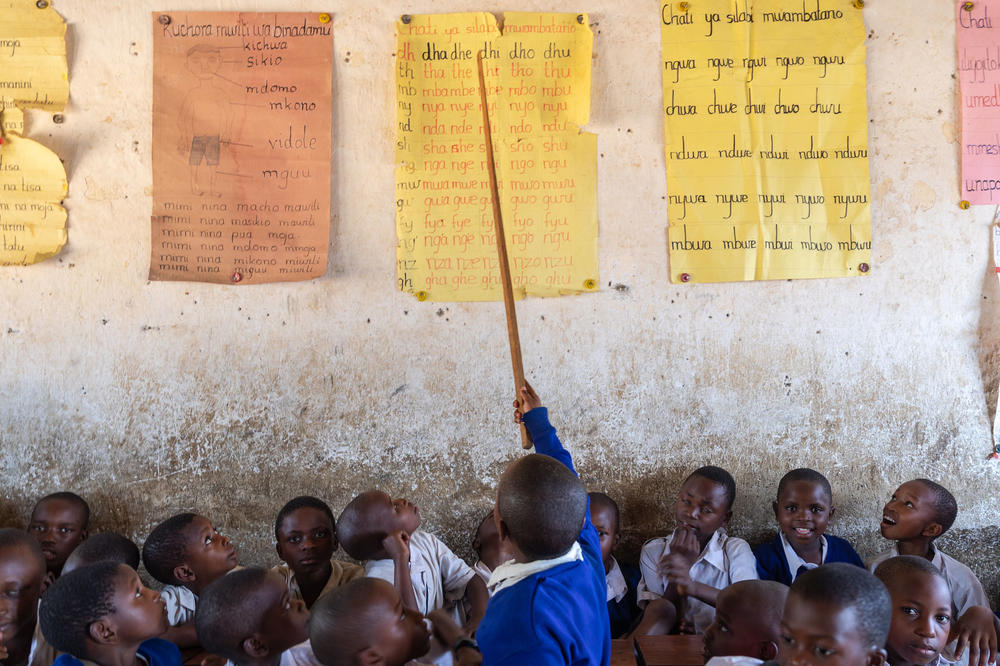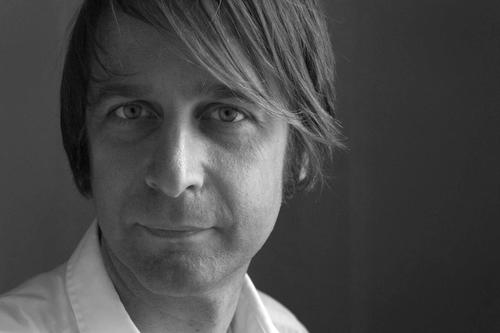Casting Off the European World View
The Dahlem Center for Linguistics was founded at Freie Universität on June 20, 2025 / Interview with Professor Ferdinand von Mengden
Jul 10, 2025
Teaching the sound–letter relationship at an elementary school in Tanzania: The opening event of the DCL on June 20, 2025, focused on African languages.
Image Credit: Rachel Chilton / USAID
The research areas at DCL range from core linguistic fields, via multilingualism and language acquisition to sociolinguistics and neurolinguistics. Supporting early-careers scholars will be an important aspect of the center. Professor Ferdinand von Mengden, director of the new center, discusses its goals, language diversity, and unique selling points.
Professor von Mengden, the Interdisciplinary Center for European Languages (iZEUS) existed at Freie Universität for twenty years. What was the motivation for establishing the new Dahlem Center for Linguistics?
Professor Ferdinand von Mengden, director of and spokesperson for the new Dahlem Center for Linguistics (DCL).
Image Credit: Personal collection
There are several reasons, some of which are related to changes in organizational formats at Freie Universität. Probably the most important reason, however, is that our priorities have changed. For instance, the designation “European” doesn’t work very well in linguistics. Languages like English or Spanish have become, to a large extent, non-European languages.
In addition, a great deal of the phenomena that linguistics addresses today cannot be understood in territorial terms. Many language practices and phenomena that are of interest in linguistic research can better be understood in dimensions such as “global” vs. “practice specific” or “urban” or “cosmopolitan” vs. “local” and so on.
What will make the new Dahlem Center for Linguistics stand out?
At the DCL the interdisciplinary research focuses range from systems linguistics, multilingualism, and language acquisition to language in social contexts and neurolinguistics. Supporting young researchers at an early stage in their careers will be an important aspect of the work. Professor Ferdinand Mengden, director of and spokesperson for the new center, discussed its goals, language diversity, and unique selling points in the following interview.
The new Dahlem Center for Linguistics aims to reach across the confines of the departments, which facilitates a collaborative spirit and integration among colleagues from various areas of expertise.
For instance, the new center will include colleagues from the Department of Education and Psychology, who conduct research on language acquisition, as well as from the Department of History and Cultural Studies, who work on Semitic languages, Iranian languages, Turkic languages, and the history of science. We have been in touch with many of these colleagues for a long time, but there has not been any institutional bridge across the administrative structures of the academic departments and institutes.
What is unique about linguistics at Freie Universität?
One of our unique features in the Berlin area is certainly our sociolinguistic focus. There are research projects on language variation, for instance on Italian dialects, on varying forms of address and politeness in the German-speaking area, or on conversation analysis. Not too long ago a project made headlines in which interaction patterns of a group of archaeologists were recorded and analyzed as they reconstructed a Stone Age hut. There are also projects that examine the coexistence of several colonial languages and indigenous languages in various postcolonial contexts such as in Namibia or the Amazon region.
Then the cognitive sciences and neurolinguistics play an important role in linguistic research and in our study programs at Freie Universität Berlin. How do our mind and brain function when we speak? This is a particularly exciting field because it nicely combines research questions and methods from the natural sciences and the humanities.
Our highly successful degree programs Language and Society (BA) and Linguistics (MA) reflect this diversity. The bachelor’s degree program in Language and Society has been particularly popular ever since it was first set up. If we had the capacity, we could accommodate many more students. Our students are enthusiastic about current questions relating to society. How do people interact linguistically in a multilingual space like Berlin? Or what linguistic and communicative patterns can be observed through new, digital forms of communication.
Unfortunately, this potential is currently under threat by the budget cuts of the Berlin Senate. According to the current austerity measures, there is concern that we will not be able to continue these programs.
What will change and what will remain after the reorganization?
At first we will transfer the structures and procedures of iZEUS, the predecessor organization, to the new DCL. We are already integrating colleagues from the other departments. This means that we are currently working within the existing internal organizational structure. There is a general assembly, official representation of early-career scholars, an executive board, and procedures for coordinating the degree programs and for other activities which need to be continued. We are currently working on a new statute, which will give the new center an administrational structure.
We expect the new organization of the DCL to have a positive impact on our work. We will be a larger and a more diverse group of scholars. Our perspectives and expertise will expand as a result, and we are looking forward to that!
Will you continue to host the Dahlem Lectures in Linguistics?
Yes, we definitely intend to continue this tradition. The linguistics lecture series that we have been organizing for about the past twenty years is an integral part of our semester routine. Every other Tuesday we invite local and international linguists to present their research. We expect that in the future the topics of the lectures will become even more diverse due to our wider expertise. That will be an additional benefit both for the university and the public.
At the opening event of the DCL on June 20, you focused on African languages. Can you tell us why?
We took the opportunity of the opening event to also welcome Dr. Bert Remijsen from the University of Edinburgh to Freie Universität. Dr. Remijsen has been awarded a grant from the European Research Council for a research project on “Tonality in the Morphology of Nilotic Languages,” and he decided to locate his project at Freie Universität.
Nilotic languages are spoken in South Sudan. Tonality means that differences in pitch encode grammatical functions that are expressed in various European languages by word endings.
With the focus on African languages, we also wanted to draw attention to the fact that language practices and language attitudes outside Europe do not correspond to the Western idea of homogeneous standard languages and their associated “dialects.” The way different linguistic practices coexist in the same space is often quite different from what we observe in Europe. And multilingual settings receive different social evaluations and rely on different patterns of linguistic prestige than in Europe.
We don’t need to study Africa to make this point, but it is enlightening to do so. In this sense it is certainly helpful to take off the European glasses for a moment when studying human language.
Christine Boldt conducted the interview. The original German version appeared in campus.leben, the online magazine published by Freie Universität Berlin.


